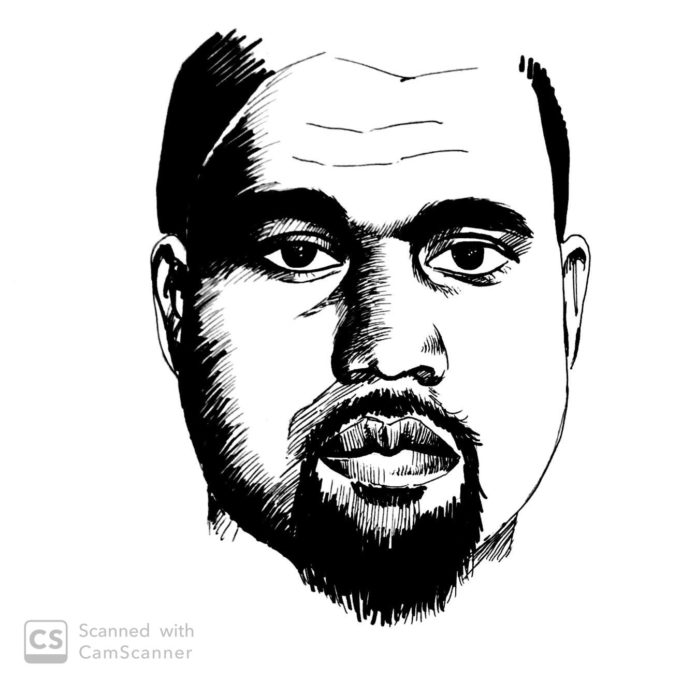For the last six years, Chicago-born rapper Kanye West has been in a state of creative limbo. In 2016, the 42-year-old showed cracks of insecurity through his attempt to hide behind younger peers on “The Life of Pablo.” Two years later, he retreated to his ranch in Wyoming, only to release the worst collection of songs in his entire career. If you thought you could smell his desperation on “Father Stretch My Hands,” then it reeked by the haphazard record that is “Ye.” Those projects, the latter especially, lacked the eccentric coherence that made his music compelling from “College Dropout” to “Yeezus.” I was turned off by the way his performance as a cultural mouthpiece cloaked his waning interest in the quality of his musical output. Amidst artistic crisis, Kanye is consistent and clear about his pursuits in the fashion industry. I recognize the tide-altering impact of what he ultimately achieved in that domain, but the ripple effects of celebrity as currency does shrink the possibilities of fashion as an art form. In the beginning of this decade, the scrappy superstar was at the peak of his musical powers with consecutive albums “My Beautiful Dark Twisted Fantasy” and “Yeezus.” Until now, I felt secure in my sense that Kanye’s post-Yeezus residency in the swirling center of pop culture had truly reached its vampiric phase.
For Kanye’s newest record, titled “Jesus is King,” the rapper follows the pop culture mythos of British jangle-pop frontman Morrissey. He flips the script and reifies The Smiths frontman’s lyric “In our lifetime those who kill/ the news world hands them stardom/and these are the ways on which I was raised.” In building his narrative, Kanye takes advantage of the insight from Morrissey’s first observation as it digs underneath the nature of sensationalism. Still, his recent conversion to Christianity comes with an acknowledgement of his own participation and a skepticism of its spiritual effect. The fascinating application of his latest identity is in his synchronous mapping of new personal priorities. He is not abandoning his idea of progress, but rather shifting it to an age-old center.
The transformation of one of pop music’s most notorious agitators is suspicious, but it can be understood by going straight to the source. Kanye’s annual album cycle interviews with BBC Radio 1 host Zane Lowe routinely pierce through the confusion of his messy rollouts. For two hours, their conversation scratches the surface of nearly everything except music. In this year’s iteration, Kanye’s barking style of communication is supplanted by a calm and patient demeanor. It gives off the feeling of lightness that translates onto the record.
From a conceptual point of view, “Jesus is King” is Kanye’s first idiosyncratic reading of American culture since 2013. With fresh eyes, he re-examines the secular phenomenons he once helped propagate. His sincere but often muddled goading is reshaped into coherent declarations of faith. On the Chick-fil-A inspired track “Closed on Sunday,” the casual joke works as a bridge to his new professional outlook. No matter their politics, the chicken restaurant chain does give up a full day of business on account of religious principle. Religious loyalty remains central to their operations, despite their expanding commercial success. Perhaps it is partly in reference to rumors that he will no longer be making secular music.
I assumed the record would fall into the trap of hyper-relevant commentary, as Kanye is fond of fusing personal feelings with public narrative. Over the last few years, I wondered how long he would go on with his entrepreneurial corporate raps and hymns to Steve Jobs. At any rate, spare his bragging about tax exemptions and those reflexes are largely kept in check. On the song “God Is,” Kanye unravels for the most touching and telling verse of his recent catalogue.
He raps, “All my idols let them go/All the demons let them know/this a mission not a show/This is my eternal soul.”
The meaning of his current artistic bent is encapsulated in those lyrics. At first it sounds like a retirement speech, before Kanye replaces “show“ with “mission“ to establish a permanent purpose. Instead of resenting the secular entertainment world, he finds peace in letting it go. His aspirations were and possibly still are tied up in the wrestling arena of culture. That being said, his competitive nature is turned inward for a battle of the soul.
In terms of its detail, the album is ordinary and outside of a few lyrics the writing is a bit clunky. These are not new features in Kanye’s career. On “Jesus is King,” his full-scale commitment to a concept is its own achievement. I did not think that was probable after such a lazy string of records. The different tones and compositions spread throughout his discography cover his lyrical deficiencies. Rick Rubin’s editing touch on “Yeezus” is superior to anything from “Jesus is King,” but in 2019, Kanye is still sticking to his recognizable blueprint.
The record is an outlier given the singularity of its content. However, that does not explain its sour reception from the music media. Sterile and bitter criticism from The Fader and Pitchfork reveal how comically predictable their perspectives have become. The same outlets who maintained gatekeeper status in the digital age by slavishly feeding into Kanye’s bloat, now petulantly sneer at his ideas of religious faith. Kanye’s engagement with the metaphysical is at odds with their devout focus on material power.
![]()




































